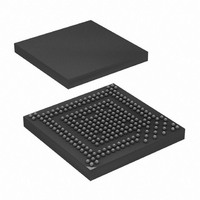AT91SAM9G20B-CFU Atmel, AT91SAM9G20B-CFU Datasheet - Page 20

AT91SAM9G20B-CFU
Manufacturer Part Number
AT91SAM9G20B-CFU
Description
IC MCU ARM9 247-LFBGA
Manufacturer
Atmel
Series
AT91SAMr
Datasheet
1.AT91SAM9G20B-CU.pdf
(42 pages)
Specifications of AT91SAM9G20B-CFU
Core Processor
ARM9
Core Size
16/32-Bit
Speed
400MHz
Connectivity
EBI/EMI, Ethernet, I²C, IrDA, ISI, MMC, SPI, SSC, UART/USART, USB
Peripherals
DMA, POR, PWM, WDT
Number Of I /o
96
Program Memory Size
64KB (64K x 8)
Program Memory Type
ROM
Ram Size
96K x 8
Voltage - Supply (vcc/vdd)
0.9 V ~ 1.1 V
Data Converters
A/D 4x10b
Oscillator Type
Internal
Operating Temperature
-40°C ~ 85°C
Package / Case
247-TFBGA
Processor Series
AT91SAMx
Core
ARM926EJ-S
Data Bus Width
32 bit
Data Ram Size
16 KB
Interface Type
SPI, TWI, UART
Maximum Clock Frequency
400 MHz
Number Of Programmable I/os
96
Operating Supply Voltage
3.3 V
Maximum Operating Temperature
+ 85 C
Mounting Style
SMD/SMT
3rd Party Development Tools
JTRACE-ARM-2M, MDK-ARM, RL-ARM, ULINK2
Development Tools By Supplier
AT91SAM-ICE, AT91-ISP, AT91SAM9G20-EK
Minimum Operating Temperature
- 40 C
Lead Free Status / RoHS Status
Lead free / RoHS Compliant
Eeprom Size
-
Lead Free Status / Rohs Status
Details
Available stocks
Company
Part Number
Manufacturer
Quantity
Price
8.1
8.1.1
20
Embedded Memories
AT91SAM9G20 Summary
Boot Strategies
A first level of address decoding is performed by the Bus Matrix, i.e., the implementation of the
Advanced High Performance Bus (AHB) for its Master and Slave interfaces with additional
features.
Decoding breaks up the 4G bytes of address space into 16 banks of 256 Mbytes. The banks 1 to
7 are directed to the EBI that associates these banks to the external chip selects EBI_NCS0 to
EBI_NCS7. Bank 0 is reserved for the addressing of the internal memories, and a second level
of decoding provides 1 Mbyte of internal memory area. Bank 15 is reserved for the peripherals
and provides access to the Advanced Peripheral Bus (APB).
Other areas are unused and performing an access within them provides an abort to the master
requesting such an access.
Each Master has its own bus and its own decoder, thus allowing a different memory mapping
per Master. However, in order to simplify the mappings, all the masters have a similar address
decoding.
Regarding Master 0 and Master 1 (ARM926 Instruction and Data), three different Slaves are
assigned to the memory space decoded at address 0x0: one for internal boot, one for external
boot, one after remap. Refer to
A complete memory map is presented in
Table 8-1
status and the BMS state at reset.
Table 8-1.
The system always boots at address 0x0. To ensure a maximum number of possibilities for boot,
the memory layout can be configured with two parameters.
REMAP allows the user to lay out the first internal SRAM bank to 0x0 to ease development. This
is done by software once the system has booted. When REMAP = 1, BMS is ignored. Refer to
the Bus Matrix Section for more details.
0x0000 0000
0x0010 0000
0x0020 0000
0x0030 0000
0x0050 0000
• 64-KByte ROM
• Two 16-Kbyte Fast SRAM
– Single Cycle Access at full matrix speed
– Single Cycle Access at full matrix speed
summarizes the Internal Memory Mapping for each Master, depending on the Remap
Address
Internal Memory Mapping
Table 8-1, “Internal Memory Mapping,” on page 20
Figure 8-1 on page
BMS = 1
ROM
REMAP = 0
USB Host User Interface
SRAM0 16K
SRAM1 16K
EBI_NCS0
19.
BMS = 0
ROM
6384DS–ATARM–13-Jan-10
SRAM0 16K
REMAP = 1
for details.




















